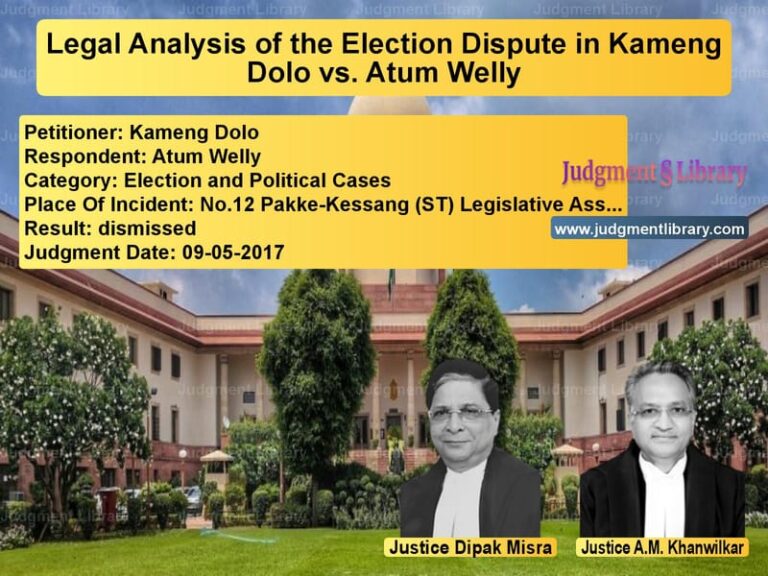Equitable Mortgage and Delay in Justice: Supreme Court’s Landmark Ruling
The case of A.B. Govardhan vs. P. Ragothaman presented crucial legal questions regarding the enforceability of equitable mortgages, procedural lapses in legal representation, and the condonation of delay in filing appeals. This Supreme Court judgment navigates through the intricacies of mortgage law, contractual obligations, and procedural fairness in the Indian judicial system.
The dispute originated from a loan transaction in which the appellant, A.B. Govardhan, claimed that he had lent Rs.10,00,000 to the respondent, P. Ragothaman, against the security of his immovable property. The case involved multiple financial instruments, including mortgage deeds and promissory notes. However, due to defaults in repayment, the appellant moved to enforce the mortgage through legal proceedings. The litigation took several turns through the High Court before reaching the Supreme Court, which ultimately ruled in favor of the appellant.
Background of the Case
The respondent, engaged in the building materials business, approached the appellant in February 1995 for a loan of Rs.10,00,000. Due to financial constraints, the loan was split into various security instruments, including two mortgage deeds and four promissory notes. The appellant contended that these transactions constituted an equitable mortgage by deposit of title deeds.
The respondent, having defaulted in payment, attended several panchayat meetings where he acknowledged his liability. During one such meeting in June 2000, he handed over title documents to his property, allegedly as security for the loan. A written agreement was drawn up, but the respondent neither repaid the remaining dues nor executed a sale deed as per the agreement. This led the appellant to file a civil suit for recovery of dues through mortgage enforcement.
Legal Proceedings and High Court Verdict
The case was initially heard by a Single Judge of the Madras High Court, who ruled in favor of the appellant. The court found that the respondent had agreed to create an equitable mortgage by depositing title deeds, thus making the appellant eligible to enforce the mortgage for recovery.
However, the respondent appealed to a Division Bench of the High Court, which overturned the Single Judge’s ruling. The Division Bench held that there was no clear evidence of a mortgage and that the agreement was more in the nature of a sale transaction. It also noted procedural irregularities in the case, particularly the absence of the appellant’s legal representation during the appeal.
Supreme Court’s Analysis and Ruling
The Supreme Court took a detailed view of the facts and legal principles governing equitable mortgages. It emphasized three essential elements for an equitable mortgage:
- The existence of a debt.
- The deposit of title deeds.
- An intention to create a security for the debt.
The Court found that all three elements were satisfied in this case. The agreement signed in the panchayat clearly indicated that the respondent had handed over title documents as security for the outstanding debt. Additionally, the respondent’s failure to execute a sale deed or redeem the mortgage pointed toward an obligation that remained unfulfilled.
The Supreme Court also addressed the procedural lapses in the High Court’s handling of the appeal. The appellant was not adequately represented in the appeal due to the mistaken belief that his counsel had only been engaged for an initial procedural matter. The Court criticized the High Court’s decision to proceed with the appeal ex parte, stating that litigants should not suffer due to legal miscommunication or misrepresentation.
Key Observations by the Supreme Court
In delivering its judgment, the Supreme Court made several important observations:
- “The Division Bench fell in error in concluding that ‘The plaint averments are self-contradictory, vague and do not make out a clear case of mortgage.’”
- “It is well settled that an equitable mortgage is created not merely by a written instrument but also through acts of parties, including the deposit of title deeds.”
- “While condoning delays, courts should ensure that procedural technicalities do not defeat substantive justice, particularly when the delay is due to factors beyond the litigant’s control.”
Final Judgment and Relief
The Supreme Court set aside the High Court’s Division Bench ruling and restored the Single Judge’s judgment in favor of the appellant. However, the Court modified the interest rate from 36% per annum to a more reasonable 12% per annum, considering it excessive.
Additionally, the Court imposed a cost of Rs.1,20,000 on the appellant due to the procedural complications caused by his legal counsel’s lapses. This amount was directed to be distributed among juvenile welfare programs, advocate-clerks’ welfare funds, and legal aid services.
In condoning the delay in filing the appeal, the Court cited precedents such as Collector, Land Acquisition, Anantnag v. Mst. Katiji, emphasizing that substantial justice should take precedence over procedural rigidity.
Implications of the Judgment
This ruling has significant implications for future cases involving equitable mortgages and procedural fairness in litigation:
- Reinforces the principle that deposit of title deeds, even without a formal mortgage deed, can constitute an enforceable equitable mortgage.
- Ensures that procedural lapses, particularly those related to legal representation, do not unfairly prejudice litigants.
- Encourages courts to adopt a pragmatic approach while dealing with delays in appeals, favoring justice over technical dismissals.
The case of A.B. Govardhan vs. P. Ragothaman underscores the judiciary’s commitment to balancing procedural discipline with substantive justice, ensuring that genuine claims are not thwarted by technicalities.
Petitioner Name: A.B. Govardhan.Respondent Name: P. Ragothaman.Judgment By: Justice Hima Kohli, Justice Ahsanuddin Amanullah.Place Of Incident: Chennai.Judgment Date: 28-08-2024.
Don’t miss out on the full details! Download the complete judgment in PDF format below and gain valuable insights instantly!
Download Judgment: a.b.-govardhan-vs-p.-ragothaman-supreme-court-of-india-judgment-dated-28-08-2024.pdf
Directly Download Judgment: Directly download this Judgment
See all petitions in Contract Disputes
See all petitions in Debt Recovery
See all petitions in Specific Performance
See all petitions in Judgment by Hima Kohli
See all petitions in Judgment by Ahsanuddin Amanullah
See all petitions in allowed
See all petitions in Modified
See all petitions in supreme court of India judgments August 2024
See all petitions in 2024 judgments
See all posts in Civil Cases Category
See all allowed petitions in Civil Cases Category
See all Dismissed petitions in Civil Cases Category
See all partially allowed petitions in Civil Cases Category







